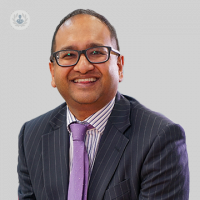BPH: what is it, and how is it treated?
Written by:In this article below, we learn all about benign prostate enlargement, as distinguished consultant urologist, Mr Sam Datta, provides an all-you-need-to-know guide with regards to the debilitating male-affecting condition.

What is benign prostate enlargement?
Benign prostate enlargement, also known as benign prostatic hyperplasia (BPH), is a common condition that affects many men as they age. While BPH is not cancerous, it can cause bothersome urinary symptoms and affect quality of life. Fortunately, there are several effective treatment options available for managing BPH and alleviating its symptoms.
What are the main treatment options for BPH?
One of the most common treatments for BPH is medication. Alpha-blockers and 5-alpha reductase inhibitors are commonly prescribed to relax the muscles of the prostate gland and improve urinary flow.
These medications can help relieve symptoms such as urinary frequency, urgency, weak stream, and nighttime urination. However, they may take several weeks to months to achieve maximum effectiveness, and long-term use may be necessary to maintain symptom relief.
In addition to medication, minimally invasive procedures may be recommended for men with moderate to severe BPH symptoms that do not respond adequately to medication or who wish to avoid long-term medication use. These procedures include:
- Transurethral resection of the prostate (TURP): TURP is a surgical procedure performed under general or spinal anaesthesia to remove excess prostate tissue that is obstructing the urethra. During the procedure, a small instrument called a resectoscope is inserted through the urethra, and the surgeon uses heat or electricity to remove the enlarged prostate tissue.
- Laser prostate surgery: Laser prostate surgery, including procedures such as photoselective vaporisation of the prostate (PVP) and holmium laser enucleation of the prostate (HoLEP), uses laser energy to vaporize or remove excess prostate tissue, relieving urinary obstruction and improving symptoms.
- UroLift® System: The UroLift System is a minimally invasive procedure that uses small implants to lift and hold the enlarged prostate tissue away from the urethra, reducing obstruction and improving urinary flow. The procedure can be performed in a clinic setting under local anaesthesia and typically does not require overnight hospitalisation.
- Prostatic artery embolisation (PAE): PAE is a non-surgical procedure that involves injecting tiny particles into the arteries supplying the prostate gland to reduce blood flow and shrink the prostate tissue. PAE can improve urinary symptoms and may be an option for men who are not candidates for traditional surgery.
The choice of treatment for benign prostate enlargement depends on various factors, including the severity of symptoms, the size of the prostate gland, the patient's overall health, and personal preferences. Men with BPH should discuss their treatment options with a healthcare provider to determine the most appropriate approach for their individual needs and goals. With proper management, most men with BPH can experience significant symptom relief and improved quality of life.
If you wish to consult with Mr Sam Datta, just head on over to his Top Doctors profile today.


